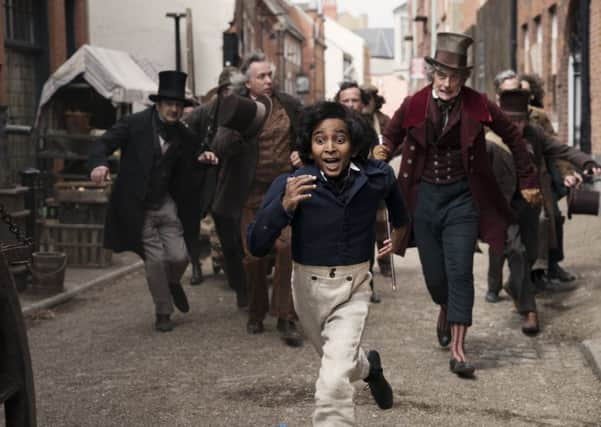Film reviews: The Personal History of David Copperfield | Richard Jewell


The Personal History of David Copperfield (PG) ***
Richard Jewell (15) ***
After generating great comedy from dark material with The Death of Stalin and his debut feature In the Loop, Armando Iannucci cuts loose with an adaptation of The Personal History of David Copperfield, Charles Dickens’s tale of a young social climber’s journey to become a successful writer. If that seems like a left-field move into less fraught source material, Iannucci’s sense of absurdity remains thoroughly intact, using Dickens’s story to poke fun at the rigidity of the British class system and simultaneously overturning the staid conventions of the British heritage drama with, among other things, an admirable commitment to colourblind casting. Starting with Dev Patel as the eponymous lead, Iannucci fills key roles with actors of colour, never drawing attention to it with the script, just letting the presence of Patel, or, say, Bendedict Wong as Mr Wickfield, or Nikki Amuka-Bird as the social-status-obsessed mother of David’s upper-crust friend Steerforth (played by Aneurin Barnard) subtly critique the lily-white, historically questionable casting tendencies of the traditional costume drama.
It’s a smart move too, because it’s hard to think of another young British actor as good as Patel to play a character as genial as Copperfield, whose smarts and irresistibly defiant nature – particularly when confronted with his loathsome stepfather, Mr Murdstone (Darren Boyd) – send him careening through life, his fortunes rising and falling as he gathers material for what will one day be his magnum opus. Like Greta Gerwig’s recent adaptation of Little Women, this is very much a film about authorship and how personal experience can be shaped into a narrative that’s in conversation with its creator’s reality. Indeed, this is the other way Iannucci seeks to liberate the classic literary adaptation from convention. Framing the film as a public performance of the text we’re about to see dramatised, the film pinballs through Copperfield’s life in quite fanciful ways, with scene transitions that literally rip David from one moment to another and other characters requesting they be written out of the story. Though these bold creative flourishes are somewhat in keeping with the spirit of Copperfield as an erratic, somewhat unreliable narrator, they also help Iannucci condense such an episodic, door-stopper of a novel into a two-hour running time.
Advertisement
Hide AdNevertheless, in working so hard to set the story free, Iannucci seems to have come a little unstuck himself. Too often he gives in to the story’s whimsical elements and it all just feels a bit much, especially when his roving camera work and turned-up-to-eleven cast give the film the chaotic feel of an ersatz Terry Gilliam movie. Not that there aren’t pleasures to be had within this. As Copperfield’s eccentric aunt and benefactor, Betsey Trotwood, Tilda Swinton is blast and Ben Whishaw is perfectly creepy as the insidious Uriah Heep. There are lovely performances too by Hugh Laurie as Betsy’s tragic lodger, Mr Dick, and Peter Capaldi as the eternally optimistic, eternally down-on-his-luck Mr Micawber. But it lacks the comic precision and discipline of Iannucci’s earlier films and the story never feels quite as compelling as it should.
Richard Jewell finds 89-year-old Clint Eastwood somewhere near the top of his directorial game with a flawed but fascinating portrait of the security guard who discovered the pipe bomb that exploded at the Atlanta Olympic Games in 1996, killing one person and injuring dozens more. The casualties could have been much greater had Jewell’s dogged commitment to his job not forced the authorities to start clearing the area before the nail bomb went off; and yet for his efforts he soon found himself implicated in the crime, becoming the subject of a media frenzy after the FBI profiled the wannabe law-enforcement officer as a false hero who may have planted the bomb himself so he could find it and save the day. In his typically no-nonsense style, Eastwood sketches out a full picture of Jewell, played brilliantly by Paul Walter Hauser. Essentially a do-gooder whose weight issues, emphatic enforcement of the rules and close relationship with his mother, Bobi (Kathy Bates), made others suspicious of him, Richard finds himself betrayed by a system he firmly believes in as the FBI, looking to make headway in the case, see in him only the stereotypical overweight loner looking for attention. The film’s first act is a lesson, quietly building tension as Eastwood elegantly runs through ten years of Richard’s life as the film builds up to the bombing and its immediate aftermath. It’s just too bad that in the ensuing investigation scenes he needlessly demonises Kathy Scruggs (Olivia Wilde), the reporter who broke the story of the FBI’s interest in Jewel.
Suggesting that she slept with her sources to get information is a lazy, sexist way to discredit her and works against the film’s own commitment to seeing beyond the surface image of its protagonist (it’s hardly redeemed by the tear-jerking speech from Bates late on that teaches Skruggs the error of her ways). And yet, this frustrating creative choice aside, Eastwood takes the film in some interesting directions by sticking to documented facts, zeroing in on Richard’s reluctant decision to fight back against the system he loves and never shying away from the reality that the bombing itself was an act of right wing, homegrown terrorism. Sam Rockwell is also on typically sparkling form as Richard’s libertarian lawyer. ■